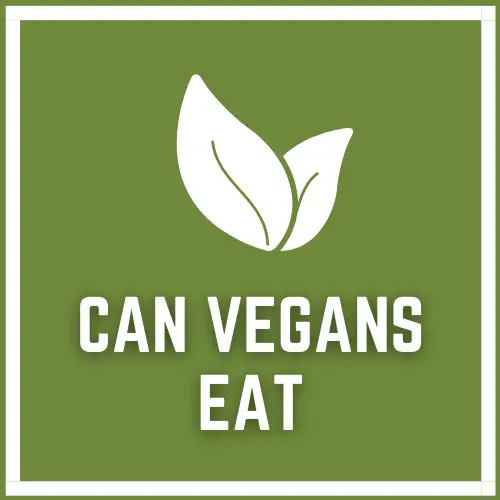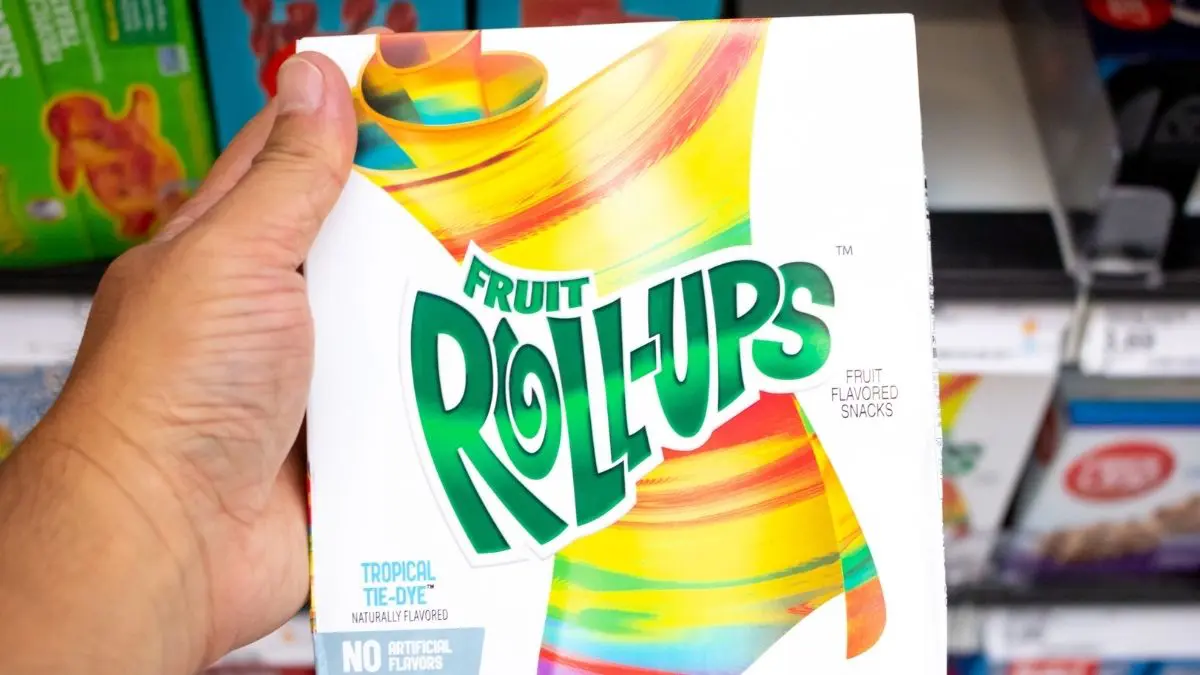Answer: It depends.

These candies are just pieces of dried, chewy, and stretchy fruit strips, so what is the fuss all about? Based on all the ingredients in Fruit Roll-Ups, none are directly derived from animal products. That right there answers the question.
But truth be told, even though Fruit Roll-Ups are considered vegan by most standards, veganism isn’t just about not eating animals but objecting to animal cruelty too. A handful of controversial ingredients in this product are surely not animal-sourced but may go through animal testing.
This is why plant eaters tend to be skeptical about Fruit Roll-Ups. But don’t worry! We’re here to break everything down to help you find answers to your doubts, and by the end of this article, you may have a clearer view of where you stand with this.
Table of Contents
What Are The Ingredients Of Fruit Roll-Ups?
According to their maker, the ingredients of Fruit Roll-Ups are as follows, and we’ve labeled them first as “Vegan-Safe” and “Vegan… But” to give you a general overview before we go beyond the superficial stuff:
| Corn Syrup | Vegan-Safe |
| Sugar | Vegan… But |
| Pear Puree Concentrate | Vegan-Safe |
| Maltodextrin | Vegan-Safe |
| Palm Oil | Vegan… But |
| Citric Acid | Vegan-Safe |
| Sodium Citrate | Vegan-Safe |
| Monoglycerides | Vegan… But |
| Fruit Pectin | Vegan-Safe |
| Malic Acid | Vegan-Safe |
| Vitamin C (Ascorbic Acid) | Vegan-Safe |
| Acetylated Monoglycerides | Vegan… But |
| Natural Flavor | Vegan… But |
| Colors (Red 40, Yellow 5 & 6, Blue 1) | Vegan… But |
Sugar
Usually, sugar is derived from sugar cane or sugar beets, so it is vegan. What’s questionable is that the bleaching and refining process of most sugars is through bone black or bone charring which are sourced from burned animal bones.
Although there are alternative processes available, such as using activated charcoal, the only way consumers can know how sugar in Fruit Roll-Ups is bleached and refined is by contacting and finding answers from the manufacturer, but unfortunately, as of today, they have no comments on this.
It is also important to note that consuming sugars that underwent the bone char process does not mean ingesting the dead bones of the animal.
Palm Oil
Just like sugar, palm oil is naturally-sourced and vegan. It is derived from the fruits of palm trees, but it has been in controversy because of bad practices, especially concerning deforestation that affects the animal kingdom. The most famous known species affected by this are the orangutan family.
Although there are certain RSPO-accredited palm oils to show their sustainability, many palm oils are still not certified. Also, recent investigations showed that even certified industries are still involved in unethical and abusive processes until now.
Monoglycerides / Acetylated Monoglycerides
These ingredients act as an emulsifier to improve the consistency and texture of Fruit Roll-Ups. Furthermore, it helps prevent the stickiness of the product.
Many vegans are skeptical about this since they are sourced from animals or plants. Although there have been reports that Fruit Roll-Ups contain monoglycerides that are plant-based, there is a need to check in with the manufacturer to be really sure.
Another reason is that it is formed from glycerol and fatty acids, so for lifestyle-conscious individuals, it is really advisable to limit fat intake.
Natural Flavors
These ingredients also raise doubts in the vegan community since “Natural” is a vague and general term. It could mean they are from natural sources such as microbes, animals, and plants. There are no absolute ways to determine these natural flavors unless stated or confirmed by the manufacturer. Regarding Fruit Roll-Ups, it was not stated, so we are in the gray area here.
Colors
Red 40, Yellow 5 & 6, and Blue 1 are all found in Fruit Roll-Ups as coloring agents. Red 40 is derived from coal tar, while Yellow 5 & 6 and Blue 1 are derived from petroleum. These are all artificially sourced but approved for use because they all passed animal testing.
Countless animals have not only suffered but actually died during the process for these dyes to make it to our groceries and pantries. They were exposed to hazardous conditions for human gain and consumption at a given amount.
However, large and frequent intakes of these dyes can also threaten our health, especially children. So these are the types of ingredients we should look out for when checking the label on the products we buy.
Are Fruit Roll-Ups Healthy?
Since we’ve already gone through the questionable ingredients, let’s see what this fruity snack can still offer us with its vegan-safe ingredients. Here’s a table that might help you weigh the factors. An important note you can always put in mind is a healthy ingredient can become a poison based on the dose or amount of consumption.
| Ingredient | Source | Information |
|---|---|---|
| Corn Syrup | Corn Starch | High consumption may lead to obesity and overweight problems. |
| Pear Puree Concentrate | Fresh Pear Fruit | Adds sweetness and nutritional value to your snack but isn’t counted as added sugar according to FDA. |
| Maltodextrin | Starch | Over-consumption may lead to blood sugar spikes, weight gain, and increased body fat. |
| Citric Acid | Citrus Fruits | PETA approved this as an alternative to animal-derived acids, but high and constant consumption may cause tooth decay. |
| Sodium Citrate | Citric Acid | A food additive considered safe by the FDA when used in food with no limitation other than Current Good Manufacturing Practices. |
| Fruit Pectin | Fruit | Plant-based alternative for gelatin. They are made up of mostly carbohydrates and some traces of proteins. |
| Malic Acid | Fruit or Vegetables | An additive that gives a sour taste and is considered generally safe for consumption. |
| Vitamin C | Commercially produced from glucose derived from starches. | Well known for aiding our immune system as an essential, water-soluble vitamin. |
Other Alternatives for Fruit Roll-Ups
There is one brand that actually gets mixed up with Fruit Roll-Ups, and it is Fruit by the Foot. They are from the same company, and they are also vegan, with some gray areas. You can find more information and a comparison between the two of them here.
In case you don’t sit well with Fruit Roll-Ups or Fruit by the Foot, other alternatives exist for your sweet tooth cravings. If you want a fruit snack that’s vegan-safe with no sodium, no fat, no added sugars, and lesser carbohydrates, Bear Fruit Snack Rolls are your go-to.
Another great vegan-friendly alternative is Stretch Island Fruit Leather. They have fewer calories found in every pack, no artificial flavors or colors, are non-GMO, and are made exclusively with real fruit puree.
If you’re still in the gray area but really want fruity goodness, there are a lot of DIY recipes across the internet for Fruit Roll-Ups. This may be beneficial because you know exactly what you used in the process, and you can customize or tweak it into a healthier version, especially if you’re on a diet. You’ll be amazed at how quick and easy it is to make.
Conclusion
Fruit Roll-Ups have non-animal-derived ingredients. Since the questionable ingredients are kept in minimal quantity in every pack, this snack really sits well with most vegans and their standards, but several people in the community with a stricter vegan practice view Fruit Roll-Ups as unacceptable. So it really boils down to your specific principles and perspective.
Another message from PETA that would be great to ponder is that no one can avoid every animal ingredient. According to them, being vegan is about helping animals, not maintaining personal purity. Boycotting products that may contain traces of animal products may be harmful to animals in the long run because it may cause difficulty for vegan businesses to actually offer alternatives for meat.

